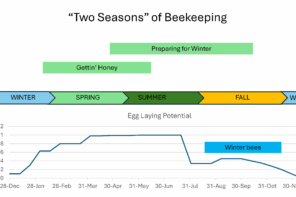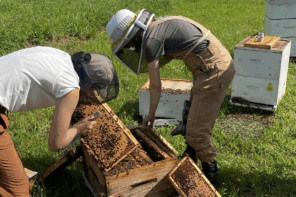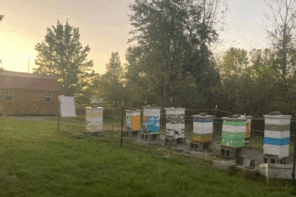 Salutations AHPA members! What a crazy start to 2022! We finally get over the hurdle that is the pandemic just to have record high gas prices and war in Ukraine waiting for us. Can we catch a break? As I’m writing this in mid-March I saw $7.29 diesel in Oakdale, CA yesterday. Yikes! It will be expensive getting the hives out of CA. A quick anti-dumping suit update: In our meeting with Customs last week, they told us that China was the country of origin for a significant portion of the imported honey they have recently tested. Customs is tight-lipped about their database for NMR and protocols (which is understandable). They have been having talks with the FDA about honey and it’s always a good sign when two federal entities are communicating. There was a 90% surge in honey from Vietnam from May 2021 to September 2021 compared to the previous five months. As a result, Commerce found critical circumstances exist and we are hoping the U.S. International Trade Commission will confirm that. Customs is already collecting antidumping duty deposits retroactively back to August. Leaders from Sue Bee and AHPA are participating in briefing and hearing preparation before the April 12 final International Trade Commission Hearing. That hearing is open to the public and will be broadcast on Webex if you want to watch. Our attorneys tell us they are optimistic for a win and a higher duty on Indian honey. The Commerce Department has put a 90-day pause on the Ukraine part of the suit due to the war there and will revisit it after July 6th.
Salutations AHPA members! What a crazy start to 2022! We finally get over the hurdle that is the pandemic just to have record high gas prices and war in Ukraine waiting for us. Can we catch a break? As I’m writing this in mid-March I saw $7.29 diesel in Oakdale, CA yesterday. Yikes! It will be expensive getting the hives out of CA. A quick anti-dumping suit update: In our meeting with Customs last week, they told us that China was the country of origin for a significant portion of the imported honey they have recently tested. Customs is tight-lipped about their database for NMR and protocols (which is understandable). They have been having talks with the FDA about honey and it’s always a good sign when two federal entities are communicating. There was a 90% surge in honey from Vietnam from May 2021 to September 2021 compared to the previous five months. As a result, Commerce found critical circumstances exist and we are hoping the U.S. International Trade Commission will confirm that. Customs is already collecting antidumping duty deposits retroactively back to August. Leaders from Sue Bee and AHPA are participating in briefing and hearing preparation before the April 12 final International Trade Commission Hearing. That hearing is open to the public and will be broadcast on Webex if you want to watch. Our attorneys tell us they are optimistic for a win and a higher duty on Indian honey. The Commerce Department has put a 90-day pause on the Ukraine part of the suit due to the war there and will revisit it after July 6th.
In other news, a huge issue is arising in California… where else right? The SGMA (Sustainable Groundwater Management Act) is starting to take effect on farmland in the state. The almond industry has practically been the hero of the beekeeping industry the last decade. With low honey prices and high mortality losses, getting three times the price for almond pollination compared to 15 years ago has helped keep many beekeepers in business. Well, with SGMA, we may see the almond industry slowing a bit. It has been amazing watching one billion pound crops turn into two billion pound crops and Blue Diamond and others market and sell all those nuts. Unfortunately, with SGMA, growers will be given an “allotment” monitored via satellite. Growers will then be charged $600-$650 per acre foot they use above their allotment, plus a replacement water fee of up to $500 per acre. One can easily foresee where this will likely go: growers will be forced to fallow some of their ground in order to remain economically viable. For example, for my almonds, the allocation was about 70% of my usual irrigation. The cause of the disparagement between my actual use and their allotted amount is that the technology is being rolled out too fast; many this past year said the meters on their wells didn’t match what the satellites said they used. There are currently two lawsuits over this in just my county, one being brought by the irrigation district itself. To add to the unfairness, those that have their land within the irrigation district will be in much better shape than those of us relying solely on well water. Wendy Wang, a water law attorney said, “A key SGMA principle is that there’s a carrot and a stick,” she said. “The local agencies will be given an opportunity to regulate a groundwater basin themselves, and if they don’t, this is the stick – the state will come in.” So you have the incentive to regulate the groundwater sustainably yourself and if not, the state will come in, and it is a national food security issue. Do we want to import more of our food? Hasn’t the covid supply chain crisis shown us the importance of having more our food and products made here? The war in Ukraine has shown us that with gas prices. Did you know, of the top 25 fruits consumed in the U.S., 43% is imported? How green is that?
The almond industry has been amazing over the years overcoming hurdles, let’s hope for our sakes they can manage to jump this hurdle. I just worry how bruised and battered all associated with the industry might look after clearing this hurdle.
Chris Hiatt
President
American Honey Producers Association









